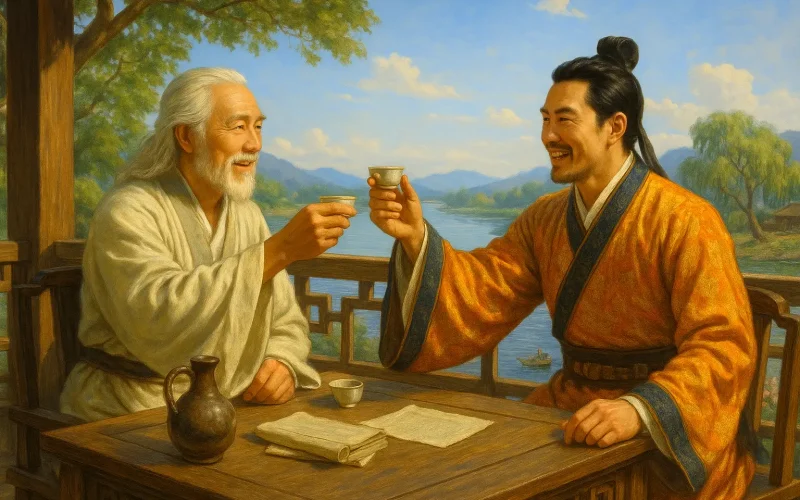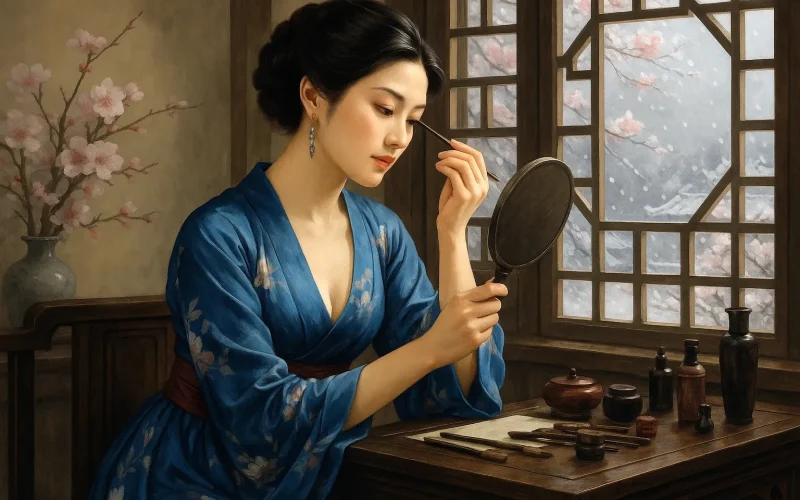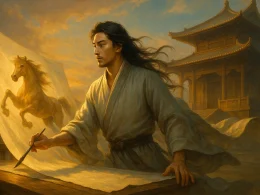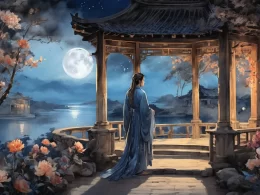The silent mountains shed their snow—the stream swells high;
A traveler crosses on an ancient fallen log.
Who knows how far these waters begin their journey?
Yet see—from the heart of hills, floating blossoms emerge.
Original Poem
「琅琊溪」
欧阳修
空山雪消溪水涨,游客渡溪横古槎。
不知溪源来远近,但见流出山中花。
Interpretation
This poem belongs to Ouyang Xiu's "Six Lyrics of Langya Mountain" series, composed in 1045 during his exile as prefect of Chuzhou. Nestled amidst the region's pristine landscapes, Langya Mountain became the poet's spiritual sanctuary, with Langya Stream ranking among its most celebrated vistas. The work captures a moment of communion with nature, blending topographical precision with philosophical contemplation.
First Couplet: "空山雪消溪水涨,游客渡溪横古槎。"
Kōng shān xuě xiāo xī shuǐ zhǎng, yóu kè dù xī héng gǔ chá.
In empty mountains, melting snows swell the stream,
Where visitors ford waters on timeworn rafts—
Archaic as the hills' first dream.
The couplet choreographs seasonal metamorphosis: "empty mountains" (空山) transition from winter's austerity to spring's liquidity through the catalytic "melting snows" (雪消). The "timeworn rafts" (古槎) serve as anthropological artifacts, connecting transient human activity with geological permanence in a single hydrological gesture.
Second Couplet: "不知溪源来远近,但见流出山中花。"
Bù zhī xī yuán lái yuǎn jìn, dàn jiàn liú chū shān zhōng huā.
The stream's origin—whether near or far—
Remains untraced,
Yet witness how it carries
Petals from the mountain's heart:
Spring's cursive script in liquid grace.
Here, hydrological mystery transforms into botanical revelation. The unseen source (溪源) becomes a metaphysical conceit, while the "petals" (山中花) serve as floral telegrams from the wilderness's inner sanctum. The couplet's structural mimicry of streamflow—from questioning headwaters to blossoming terminus—embodies the very process it describes.
Holistic Appreciation
Comprising just four lines, this poem is refreshingly concise, blending scene and emotion to vividly depict an early spring mountain stream. The poet sets the stage with melting snow and swelling waters, capturing nature’s seasonal renewal, then introduces human activity—a traveler crossing the stream—amid blossoms drifting on the current, evoking the vitality of spring. While grounded in tangible imagery, the poem also stretches imagination toward the stream’s distant source, drawing readers into its depths. The closing line, "Yet one sees only flowers flowing from the mountains," resonates with quiet profundity, hinting at unseen wonders deeper in the peaks and expressing the poet’s reverence for nature’s mysteries and his cherishing of spring’s fleeting beauty.
Artistic Merits
This compact quatrain exemplifies the hallmarks of Song dynasty landscape poetry: serene atmosphere, economical language, interplay of reality and illusion, and philosophical charm. The opening line, "Snow melts, the stream swells," immediately establishes the seasonal shift. The second line, "a traveler crosses on an ancient raft," adds a touch of timeless grace. The final couplet pivots from literal description to imaginative suggestion—the "flowers from the mountains" extend the poem’s reach beyond the visible, artfully expanding its artistic conception. Structurally, the poem circles back to its beginning, embedding emotion within scenery and embodying the refined elegance of literati landscape verse.
Insights
More than a mere landscape sketch, this poem reflects humanity’s humility and yearning in the face of nature’s grandeur. The poet, confronting the mountain stream, does not insist on tracing its origin but instead gleans meaning from the blossoms before him. This balance of concrete and abstract, this knowing restraint, embodies an aesthetic of natural acceptance and purposeful ambiguity. It reminds us that in pursuing truth or beauty, we must embrace moderation and leave room for the unknown, allowing the mind to wander freely. Moreover, the poem’s fusion of natural splendor with personal sentiment reveals Ouyang Xiu’s enduring ideal—even in adversity, to seek tranquility and elevation through communion with the natural world.
About the Poet
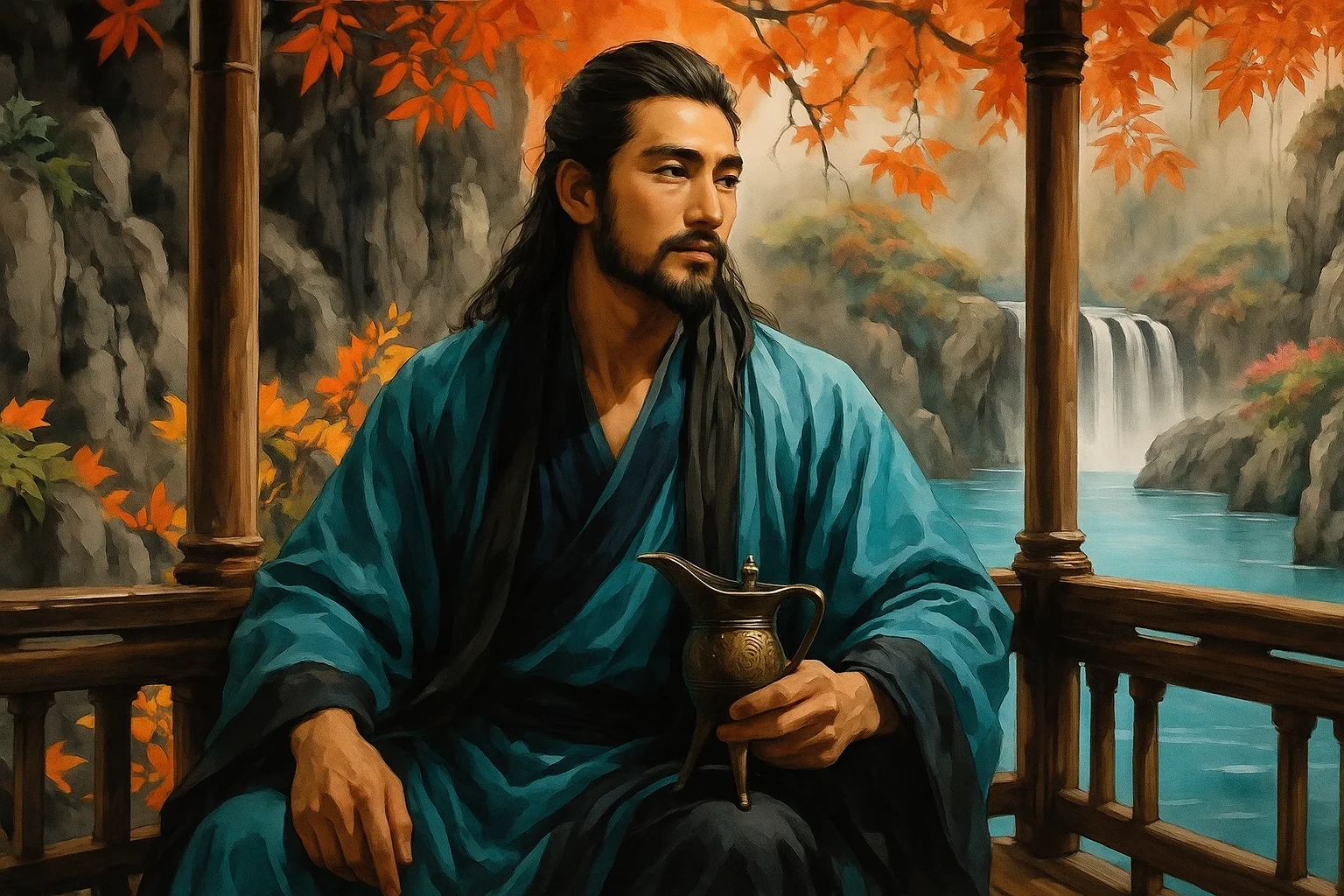
Ouyang Xiu (欧阳修, 1007 - 1072), a native of Yongfeng, Jizhou (present-day Jiangxi Province), emerged as the preeminent literary figure of the Northern Song Dynasty. After attaining the jinshi degree in 1030, he spearheaded a literary reform movement that rejected the ornate Xikun style prevalent at court. As a mentor who nurtured literary giants like Su Shi and Zeng Gong, he laid the foundation for the golden age of Northern Song literature. Recognized as one of the "Eight Great Prose Masters of Tang and Song," Ouyang stands as the pivotal figure in the transformation of Northern Song literary culture.







